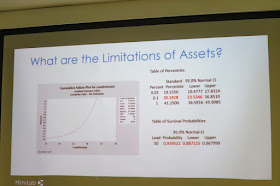Minitab
co-organized Techmax to arrange a seminar named “Machine Learning enhance
Product Reliability from Prediction to Execution” on 12th July 2018.
HKPC was executive organization and Hong Kong Society for Quality (HKSQ) and
ASQ (HK) were supporting organization.
HKSQ former chairman Dr. Albert Tsang was invited to be one of guest
speakers. I took a photo with Dr. Albert
Tsang for memory.
The
first speaker was Mr. KT Li (Consultant, Reliability Testing Centre, HKPC) and
his presentation topic entitled “Introduction of Reliability Engineering &
Highly Accelerated Life Test (HALT)”. He
briefed the definition of reliability that “The ability of an item to perform a
required function under given conditions for a given time interval”.
Reliability
is a probability that an item will last a certain time without “failure” under
certain conditions including function of time and conditions. Traditional QC assures the product will work
after assembly and as designed. Then Mr.
Li mentioned the testing and reliability engineering as following diagram.
Then
Mr. KT Li stated reliability metrics as follows:
MTBF
– Mean Time between Failures
MTTF
– Mean Time to Failure
MTTR
– Mean Time to Repair
Median
Life (50% failure)
B10
Life (10% failure)And then Mr. Li explained Censored Data that “censoring is a condition in which the value of a measurement or observation is only partially known.” There were three types of data named “Complete and Censored Data”, “Interval Censored Data” and “Left Censored Data”.
Finally,
he briefed the accelerate life assessment flow to us and shared different case
studies including Failure of Compact Fluorescent Lamp (CFL), 7 Inch Tablet,
Control Board and Power Board of Printer, Outdoor Sprinkler Timer, Wi-Fi Base
Station, etc.
Dr.
Albert HC Tsang (Former Chairman, HKSQ) was the second speaker and his
presentation topic named “Life Data Analysis for Maintenance Optimization &
Reliability Improvement”. After
introduction of HKSQ, he briefed four subjects to be discussed and they were:
1.
Evidence-based
Maintenance Decision Models
2.
Characterizing
the Risk of Failure
3.
Life
Data Analysis
4.
Statistical
Tools for Reliability Improvement
Typical
maintenance decisions for when and how frequent to do preventive replacement
after inspected items. “Preventive replacement will make sense only if it can
reduce the risk of failure (hazard rate).” Dr. Albert Tsang said. Then he briefed the preventive replacement cost
and optimizing such cost.
And
the Dr. Albert Tsang said things fail because applied stresses (load) larger
then strength. He introduced that safety
factor (uS/uL) and margin of safety ((uS - uL)/uL)
but they did not consider uncertainty of Load and Strength. Dr. Tsang showed two design with same safety
factor but different reliability.
After
that Dr. Tsang stated the Bathtub Model which had high failure rate in the
beginning and then kept constant unit wear-out failure. Sources of product life data came from
in-house laboratory testing, beta site testing, audit testing and warranty
& other field data. Dr. Tsang
mentioned how to use Weibull Distribution to show the Bathtub Model through ꞵ = 0.5, ꞵ = 1.0 and
ꞵ = 2.5.
Finally,
Dr. Albert Tsang briefed two types of failure below.
Hard Failure: Complete loss of function.
Soft Failure: Occur when a critical
performance parameter has degraded to a predefined level – the item continues
to function, but unsatisfactorily.
He
also introduced different statistical tools for reliability improvement as
follows:
-
Evaluating
individual failure modes
-
Stratified
and regression analysis
-
Degradation
analysis
-
Accelerated
testing
-
Robust-design
experiments
Dr.
Albert Tsang introduced his book at the end if participants were interested in
Reliability.
The
third speaker was Mr. Ming Dong (Senior Technical Training Manager, Minitab Pty
Ltd) and his presentation was “Using Minitab and Machine Learning Tools to
Increase Maintenance Reliability and Reduce Defective Products”. He said reliability was “The probability (0 ~
1) that a system or product would perform its intended function under normal
operation conditions for a specified period of time.
Then
Mr. Ming Dong used an example to describe the limitations of assets that
engineer test the individual wires in a dragline for their breaking
strength. Risk from cable damage were
Electric Shock, Ignition of gas or dust, and Fires. Engineers wanted to
determine the probability that a wire can withstand 50 tons of force and at what
load 0.1% of those wires start to break?
The
curse of dimensionality were described and referred to phenomena that arise
when analyzing data in high-dimensional spaces that do not occur in
low-dimensional situations.
1st
Dimension – Large Number of Predictors (Variable Dimensions)
2nd
Dimension – Large Number of Observations (Dataset Dimension)
3rd
Dimension – Complexity Due to Non-Linear Effects or Complex Interactions
After
that Mr. Ming Done introduced “Salford Predictive Modeler (SPM)” that Salford
Systems was a machine learning softward company founded in 1983 by Dr. Dan
Steinbery after he completed his PhD in Econometrics at Harvard. Minitab acquired Salford System in March
2017.
Mr. Dong explained machine learning was modern statistics plus computer science. Machine learning revolutionize manufacturing included manufacturing operation management, asset monitoring and tracking, as well as, product & business services.
Salford
Predictive Modeler aimed to optimize a large plant / company / service with
many complex process steps, many predictors, huge data sets, many complex
nonlinear effects or interactions, many missing values and outliers.
The
terminology of machine learning were described as following diagram.
Minitab
and Salford Predictive Modeler functionality comparison and they could
complement with each other. At the end,
Mr. Dong demonstrated the software to us.
Mr.
KW To (IT Manager, HKPC) was the last speaker and he introduced the Technology
Voucher Programme (TVP) and its related contents.
Reference:
Minitab
– www.minitab.com
HKPC
– https://www.hkpc.org/zh-HK/
20170901:
Minitab Seminar on “Data driven Business toward Excellence” - https://qualityalchemist.blogspot.com/2017/09/minitab-seminar-on-data-driven-business.html
20170803:
Minitab Workshop “Boost Customer Satisfaction” - https://qualityalchemist.blogspot.com/2017/08/minitab-workshop-boost-customer.html



















沒有留言:
發佈留言